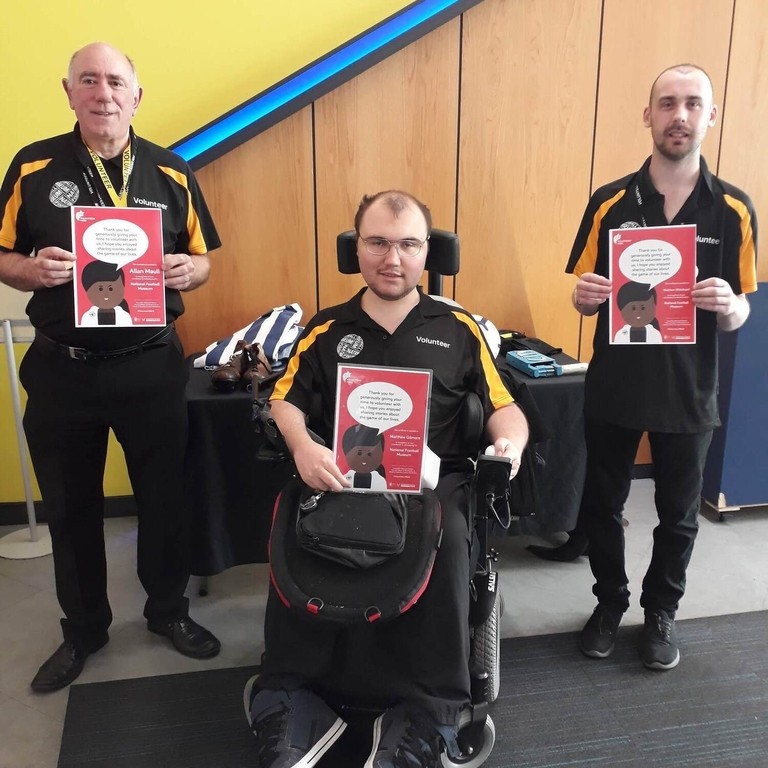Section 7: Inclusive recruitment and employment
Photo by: VisitBritain/Solstock/Getty

Top Tips
Your staff members and volunteers should be able to have the same positive, accessible experience that is available to your customers; it’s important to ‘practise what you preach’.
The visibility of job adverts and availability of workplace adjustments is key to forming an inclusive workplace. In this section, learn more about the importance of inclusive recruitment and retention processes, and how to implement them.
Disability inclusion in business can bring many benefits, not least heightening diversity in viewpoints and decision-making, but also helping to foster a culture of belonging.
Looking in: an inclusive internal culture
As well as focusing on your external reputation for access and inclusion, you may wish to think about how you could become a more inclusive employer. Numerous studies show that diverse and inclusive businesses are more productive, and a business that represents disability internally by employing those with lived experience is usually one that can be trusted in terms of accessibility and carefully considered operations.
In terms of digital accessibility, staff members should be able to experience the same inclusivity on any websites and apps they need to use as your customers can expect on your front-facing sites. Follow the recommendations in marketing your accessibility to ensure this is the case. Similarly, any built environment design feature noted in the technical design guidance within the downloads section of this toolkit should apply to back-of-house as well as customer areas, wherever relevant and practicable. In this section, you’ll learn about the operational strategies and supportive schemes that are available to ensure you practise what you preach when it comes to accessibility and inclusion for customers and colleagues alike.
More than 7.7 million people of working age in the UK are disabled or have a health condition. Encouraging applications from disabled people is good for business. It can help you to:
- Increase the number of high-quality applicants available;
- Create a workforce that reflects the diverse range of customers it serves and the community in which it is based;
- Bring additional skills to the business, such as the ability to use BSL, which could result in large savings;
- Gain access to an untapped talent pool that shouldn’t be overlooked.
Case study 1
National Football Museum
“We have regular volunteers from a wide range of ages and backgrounds engage on a weekly basis, supporting museum interpretation, child and family activities and workshops. Our pilot work placement scheme has been successful and a new cohort joins us in the Spring. Participants in the inaugural programme have transitioned into museum volunteers.”

Inclusive culture strategies
Most businesses (and the people who work there) want an inclusive internal culture in which everyone feels safe, and able to bring their whole selves to work and supported should their needs or requirements change. It is, however, an ongoing and detailed process so it’s no wonder that many organisations do not know where to start.
Inclusive culture strategies continued
Six useful steps towards inclusive culture strategies are:
Where do you want your business to be both in terms of inclusive recruitment and diverse leadership, and how are you going to get there? Start small - goals could be as simple as ‘we will actively encourage disabled people to apply for suitable roles’, ‘we will survey all current employees to check whether their accessibility requirements are being met’, or ‘we will provide all staff members with a morning of disability awareness training from an external provider’. The key is to have a plan that develops as your knowledge grows and you stick to, even when times are tough. The action checklists can you give you further ideas.
To oversee inclusive improvements, ensure your business is moving in the right, accessible direction and share regular updates with management and the rest of the team. This may be part of one person’s role or split between two or more people – for example, a senior manager or director might be responsible for strategic planning and the oversight of day-to-day tasks might fall to another member of staff. It’s important to note, however, that accessibility related work should not only fall onto the shoulders of a few; it’s something everyone should have awareness of. To ensure this happens, engage accessibility ambassadors across the organisation to help embed inclusive practices.
Whoever you choose to become an accessibility champion, whether a disabled person themselves or an ally without lived experience, engagement with disabled communities is key. Achievements and aspirations, resources and progress updates should be shared externally, where possible, as well as internally.
Many people do not share that they have an impairment or accessibility requirement as they are fearful that:
a. No action will be taken;
b. It will lead to negative judgements from others and/or;
c. They may be deemed incapable of fulfilling their role.
One of the best things you can do is turn this on its head by actively encouraging applications from disabled people and talking openly about the availability of workplace adjustments and the positive impact of a diverse workforce.
Who better to learn from than deaf and disabled people who have experience of inclusive (and not so inclusive) workplaces? Short ‘lunch and learn’ sessions can be time and cost-effective ways of learning more.
While this might only be applicable to larger businesses and organisations, it is an important step. A huge element of cultural shift and change relies on bringing people together to share worries, successes, personal experiences and agreed actions for improvement. Setting up a Disability Staff Network, or a wider Employee Resource Group (ERG) focused on diversity, inclusion and other protected characteristics, would enable that culture shift to happen from the inside-out. Visit PurpleSpace, the world’s only professional development hub for disability network leaders, for further information and resources.
While your business may benefit from an accessibility champion, everyone in the organisation needs to have a basic awareness of what it means to recruit inclusively, the kinds of workplace adjustments that are available and your business’ inclusive culture aims and aspirations.
You can find a list of training providers in Section 4: An inclusive welcome.
For further practical hints and tips on inclusive hiring and employment, please refer to the checklists that accompany this toolkit.
Inclusive recruitment
Wanting to become a more inclusive employer within the tourism industry? Follow these recruitment good practice hints and tips below:
- When writing job descriptions, really consider what you are asking for and whether certain elements might be unnecessarily exclusive. Do you really need someone with a certain number of years’ experience, a certain number of GCSEs or a driving licence, for example?
- Job adverts should include inclusive language and be made available on job sites people with accessibility requirements are likely to visit, such as EvenBreak.
- Job advert content should, where applicable and appropriate, actively encourage applications from disabled people and those with other protected characteristics.
- The application process should be as simple and logical as possible, and alternative formats of documents and forms should be made available upon request. Offer adjustments at every stage of the process.
- If an interview is to be held, the venue should be accessible and easy to find via public and private transport. Making requests for adjustments should be stress-free for the applicant.
- Post-interview, a supportive communications process should be in place to discuss future working patterns and workplace adjustments with successful applicants. A visually impaired employee may require certain digital software, for example. Going forward, regular meetings should be held as an opportunity to discuss the efficiency of these adjustments, and any amendments that may be required.
Scope provides disability recruitment training for businesses interested in diversifying their workforce by employing more disabled talent. Purple also recently hosted a webinar focused on employing and empowering neurodiverse talent. Leonard Cheshire’s Change 100 Programme works with employers to provide paid summer work placements, professional development and mentoring to disabled students and graduates.
Did you know?
Whether we like it or not, we all have unconscious biases, they are a part of being human; we are all shaped by our backgrounds, personal experiences and societal stereotypes. An awareness of these biases is however vital for hiring and employment processes to be inclusive, fair and equitable. If you’d like to learn more, Inclusive Employers, Equality and Diversity UK, and CultureAlly (US based) are three organisations that deliver training around this important issue.
Case study 2
Durlston Country Park
“Disabled people now make up over 20% of our volunteers, contributing thousands of hours of time each year, especially as part of the ‘Everyone Needs a Shed!’ project that provides an accessible community work base, enabling people of all ages and abilities to socialise and learn new skills. This has also given the staff team access to people with lived experience to help with continuing improvements.”

Reasonable adjustments
You must make reasonable adjustments to support disabled job applicants and employees. This means ensuring disabled people can overcome any substantial disadvantages they may have doing their jobs and progressing in work, as stated in the Equality Act 2010.
According to the UK Government, reasonable adjustments in work could include:
- Making changes to a disabled person’s working pattern;
- Providing training or mentoring;
- Making alterations to premises;
- Ensuring that information is provided in accessible formats;
- Modifying or acquiring equipment;
- Allowing extra time during selection ‘tests’.
When it comes to reasonable adjustments, employers may worry about the cost implications of employing a disabled person. Actually, the costs of making reasonable adjustments are often low. And help is out there: in many cases, Access to Work, a Government grant scheme, provides financial and practical support to ensure an employer is not at a disadvantage by recruiting inclusively. Additionally, the benefits of retaining an experienced, skilled employee who has an impairment are usually greater than recruiting and training new staff.
Hints and tips
- Providing interviewees with access to interview questions prior to the interview itself.
- Offering access to a range of online meeting platforms for candidates to choose from.
- Posting interview questions in the chat feature (if hosting the interview online) as well as asking them verbally.
- Ensuring appropriate sightlines for lipreading on both online and offline interviews.
- Turning on online captioning features, and/or hiring a BSL interpreter.
- Ensuring the interview venue offers step-free access and accessible toilet facilities, at minimum.
Reasonable adjustments for interviews
It might be necessary (and reasonable) to also provide flexibility on whether the interview is to be held virtually or in-person, and be empathetic to requests you receive. Virtual interviews are preferred by many candidates with accessibility requirements as they eliminate travel-related stressors, allow interviewees to be in the comfort of their own environment, and provide assistive technologies such as live captioning.
Something to consider
A moment for reflection
When you are next recruiting for a position within your business, what steps will you take to ensure accessibility in terms of the job advert content, and at interview?
Reasonable adjustments continued
What is reasonable?
Before agreeing to, or setting up a reasonable adjustment, it can be a good idea to consider the following questions:
- Will the adjustment reduce or remove disadvantages faced by a disabled employee?
- What are the financial costs of making the adjustment? Will Access to Work cover this?
- Will the adjustment disrupt employee or team activities?
- What financial or other resources do we currently have as an employer? Is external assistance available?
- Is the adjustment a ‘quick win’ or a longer-term solution? Is it big or small? Can we realistically do it?
An adjustment is not reasonable if it will impose a disproportionate burden on you as an employer. But, if an adjustment is reasonable and you do not act, your employee may be entitled to make a claim at an employment tribunal. If successful, the tribunal may order compensation or make an appropriate recommendation.
Hints and tips
- Normalise conversations surrounding reasonable adjustments; they shouldn’t be awkward or taboo but instead easy to ask for and access.
- Give colleagues options of who they discuss reasonable adjustments with; not everyone will feel comfortable speaking to their line manager about personal matters.
- Remember that impairments and accessibility requirements can fluctuate and therefore reasonable adjustments needed may change. Check in with your colleagues at interview, when onboarding and on a quarterly basis at work and ask whether their needs have altered.
- Be supportive of colleagues that ask for reasonable adjustments and open to conversations surrounding them. A reasonable adjustments request does not equate to a lack of performance at work.
Fact
Did you know?
The disability employment rate was 52.6% in July to September 2022, compared to 82.5% for non-disabled people. There is therefore a disability employment gap of almost 30% in the UK
Inclusive employment resources and support
To learn more about the support available to you when recruiting and retaining disabled employees, take a look at the following schemes:
Access to Work is a publicly funded employment support grant scheme that aims to support disabled people start or stay in work by providing:
- Aids and equipment;
- Money for extra transport costs;
- And support workers and interpreters, amongst other things.
It can provide practical and financial support for people who have a disability or long-term physical or mental health condition. An Access to Work grant can pay for practical support to enable your employee to start or stay in work, or to support you if you are self-employed.
- To feel empowered to employ more disabled people, employers need to understand disability better as a concept, as well as the benefits employing disabled people can bring to businesses. The Disability Confident Scheme is working with employers to build this awareness, with an aim to get one million more disabled people into work by 2027. As one example, Leonard Cheshire provides training sessions for managers and recruiters that are specifically focused on the Disability Confident Scheme.
- The Department of Work and Pensions has recently released a new employer advice service, providing information and guidance on how to support with employee health and disability.
- The Recruitment & Employment Confederation have produced a series of videos to guide businesses through inclusive recruitment practice, including how to use the appropriate language and top tips.
- Historic England’s Inclusive Heritage Advice Hub contains particularly useful resources and information relating to DEI in the workplace, Board diversity and how to chair meetings inclusively.
Case study 3
Grand Pier
“We have recently completed an inclusive employer course. We have learnt a lot and broadened our knowledge on challenges our customers or employees may face. This has been hugely beneficial from an employment point of view as well as a customer point of view. We are now looking at developing multiple versions of our documents such as the staff handbook to cater to those with different needs.”
The team at Grand Pier are currently in the process of working with a third party to develop job opportunities for those who are neurodivergent and presently unemployed. In addition, they are building a quiet room for both staff and customers.
“This will be available to all customers and staff who need to take some time to themselves. We will not put any restrictions on who can use it; this is part of our plan to be wholly inclusive.”
Since re-opening in 2010, the Grand Pier has welcomed team members with support workers who have flourished in their environment.
“We have welcomed reciprocal learning and feel that we can offer inclusive safe working in a supported setting.”

Disabled leadership
You can, however, go one step further than employing disabled people. Where applicable, you should be advocating for more disabled people and those with accessibility requirements to be in leadership positions, just as there are rightly similar campaigns for more women, people from ethnic minorities and those who identify as LGBTQIA+ to be in senior roles.
You’ve likely heard all the misconceptions surrounding disability: in 2021, the BBC reported that 1 in 3 people see disabled people as less productive than their non-disabled peers and therefore unable to contribute as much to society. With 17% of disabled adults having had a job offer withdrawn as a result of their impairment, these negative perceptions often result in those with accessibility requirements being even less inclined to disclose their impairments or conditions, as mentioned earlier in this section.
Promoting disabled people into leadership positions, however, can turn this on its head. It shows a strong internal commitment to accessibility and inclusion, ensures lived experience viewpoints are included at the centre of decision-making processes and not as an afterthought, and fosters a culture of belonging - one in which, hopefully, candidates will be enthused to apply for positions, employees will feel empowered to disclose their impairments, and all will ask for the adjustments they are entitled to.
Learning from one another
Don’t forget to discuss your internal improvements with your business peers, just as much as you would share your external, customer-facing successes. Change often happens from the inside out, so learning from each other when it comes to recruitment processes and workplace cultures should be integral to your accessibility improvement journey. It might even be a good idea to partner or ‘twin’ with those at a similar stage to you.
Further support
To ensure that you continue to stay up to date with inclusive learning and development within the workplace, there are numerous resources and networks as part of the Business Disability Forum – a business membership organisation specialising in disability inclusion - that we’d highly recommend you engage with. And if you’d like to engage with access and inclusion as a business movement on a global scale, look up the Valuable 500, a business collective of 500 companies, innovating together for disability inclusion.







